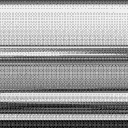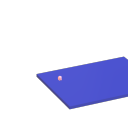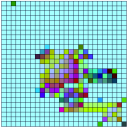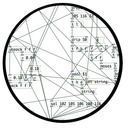Ofelia vs GEM
Hi,
Thanks for your kind works regarding some of my (experimental) abstractions with ofelia / lua.
And congrat @Jona for your impressive work!
After seeing ofelia paused for long time, I helped a bit IOhannes to point the basic issues that prevented MacOS version to work properly in order to keep at least one graphic lib alive in pd... now thanks to his work Gem came back into the game (and is still quite actively maintained).
But I must admit, me and my students where a bit frustrated by gem limitations or ofelia complexity during workshop... so I recently switched to https://cables.gl/ and I can say that I don't regret it for now.
I learned the tool in only one month, did an interactive works with it for a big design event in Asia and made my first workshop in Taïwan at same time... I will use it for teaching interactive art as it's a powerful free online tool, open source, have many ressources, there is a local app version, and... all objects (called operators) are editable in javascript.
I am still keeping an eye at pd and Gem but my energy is currently focused on cables, at least for teaching.
Plot points by importing coordinates from an external text file
Impressive examples for struct patches:
https://forum.pdpatchrepo.info/topic/10756/vanilla-struct-multislider-with-jump-on-click-and-drag
@Balwyn
https://forum.pdpatchrepo.info/topic/14009/hide-array-name/14
https://forum.pdpatchrepo.info/topic/14037/plot-graph-a-way-to-display-waveforms
Here is a workshop on data structures from some years ago (things might have changed in the meantime, but I don't know). Unfortunately the workshop-patches are not online, but you might ask João in the Pd-mailinglist.
https://media.ccc.de/v/lac2018-26-understanding_and_being_creative_with_pure_data_s_data_structures#t=1633
I am interested in how to pipe data from Pd to a fully equipped plotting-software?
https://stackoverflow.com/questions/17543386/pipe-plot-data-to-gnuplot-script
https://stackoverflow.com/questions/33457750/gnuplot-plotting-using-piped-input
@katjav https://www.katjaas.nl/plot/plot.html
(all of this is on my undone-list)
Musical online publications
Publication from the Madrid Complutense university :
https://revistas.ucm.es/index.php/CMIB/issue/view/4007
French revue Contrechant. Not exactly new but...
Neural Networks in Pure Data online workshop
@jameslo TBH, I have no idea. I'll ask them and get back to you. It ended up being a one-to-one workshop as there was only one attendant  We went through the examples that come with the [neuralnet] object and talked about neural networks, training data sets, and how to set up a network.
We went through the examples that come with the [neuralnet] object and talked about neural networks, training data sets, and how to set up a network.
Neural Networks in Pure Data online workshop
I won't be on-site either  I wish I were, but aparently it's not possible. The workshop will be online, but you'll have to sign up by sending to the email address that's at the top of the page I linked. I guess they will provide a link around those days.
I wish I were, but aparently it's not possible. The workshop will be online, but you'll have to sign up by sending to the email address that's at the top of the page I linked. I guess they will provide a link around those days.
Neural Networks in Pure Data online workshop
I will give a workshop on Neural Networks in Pd at the PikselXX AI AI AI festival, on the 19th of November, 10-13h Central European Time. The workshop is free of charge, you'll have to book your place though. It will be based on my external [neuralnet] and will cover scenarios where neural networks can be useful in a musical or more broadly, artistic context. More info here https://piksel.no/2022/11/01/pikselxx-ai-ai-ai-workshops
Pd (or even Max) homework exercises
@jjjd said:
How about the homework assignments from Miller Puckette's classes, all freely available online?
Useful link, thanks. It gives me a sense of what's realistic for undergraduates, at least.
One thing that I will do in the next cycle is alternate between a lecture one week and a workshop the next week. Students can read an outline first; then the lecture will fill in details; and then they get their hands on it the next week. This may also cut back on the number of assignments. I found in the past that many students got behind on homework and then felt that they couldn't catch up.
I also think I'm going to pull back from trying to get the students to put together some parts of the patches independently. Students who are really interested in it will do it anyway; students who aren't just get the idea that "I can't do this."
I second that. I've read the Max version, years ago, and it is a very good book.
That's good to know. I've just checked a couple of Chinese online shops and this title is available (remarkably!) but roughly twice as expensive  -- assuming 6 or 7 RMB : 1 USD, I'd have expected around 360 RMB but I find it for 719 RMB... jeez... maybe my department can spring for it.
-- assuming 6 or 7 RMB : 1 USD, I'd have expected around 360 RMB but I find it for 719 RMB... jeez... maybe my department can spring for it.
hjh
[catch~]: Would like to set the name programmatically
I remember that those limitations with signal send/receive are not easy to explain during workshop with students. For users, all those technical rules (one only to many with send~ / receive~ , use another named object Throw~ / catch~ for many to one objects) are a bit clunky to learn, even it there is a technical reason behind.
Would be a great step to be able to simplify them 
Pd FLOSS Manual, what to do with it?
@jyg said:
Yes. Indeed, I started unilateraly to edit french version of floss manual
https://fr.flossmanuals.net/puredata/quelles-sont-les-differentes-versions-de-pure-data/
Great! I might help when I'll have time!
@porres said:
They do not, by far, replace "all pd-extended", nope, sorry, not a fact. Where's ceammc's GEM replacement for instance?
True. That's another topic, but I am using ofelia abstractions to replace Gem in puredata vanilla and ceammc lib. I think efforts for video processing on pd should be focused on it in the future since Gem is always broken on OSX and openframeworks is stil an active project.
@porres said:
And what are you suggesting with "Purr Data + ceammc lib"? A Floss manuals for both?
I was just dreaming that one day the modern GUI of Purr Data could meet the good organization of ceammc-lib,
@porres said:
Folks, when I started this thread, I made no mention to Purr Data. Purr Data is something else. I get the confusion, I get the relation, it's not out of purpose to bring this up here, but I want to make things clear.
I just thought that the actual old extended could be re-usable (movable?) to a Purr data specific flossmanuals and not completly thrown away...
I agree with making flossmanuals a PureData (pd-vanilla) compatible manual. I just pointed out that flossmanuals PureData could be written in a more accessible way than pd-manuals itself, and could include some externals like else or ceammc later for exemple.
ceammc lib is handy and too few people know it for exemple. It allows me to make my last workshops less confusing by using a great and exhaustive set of objets grouped by their function and they really "simplify the learning process and makes the language itself more clear."
Contribute to better Pd Documentation
As a Puredata teacher in a fine art school since 10years (and many workshops in China) the only solution for me to make pd "usable" by my students, was to distributed my own puredata version modified with translated help files from an "computer-scientist" to an "artist" point of view, and with many extra things.
@whale-av said:
Maybe adding a "Documentation" link to the console help menu would be a good first move....?
I agree, if only clickable link could be added to console.
The doc subfolder names are not enticing..... "3.audio.examples" really could be "3.digital.audio.tutorial" for example.
I don't think there is even a link to it in the "HTML Manual" which becomes "PD Documentation" when it is opened.
All very confusing though as the Pd.doc folder is mostly a patching tutorial that complements the Floss manual.
I agree, the documentation could a bit more explicit and well organised. I simply don't use it and added mine.
Finally, Here is an example of my pd version that I throw to students now to have a chance to keep them in the game:
-
I am using ceammc a lot, and added some objets and a simple theme:
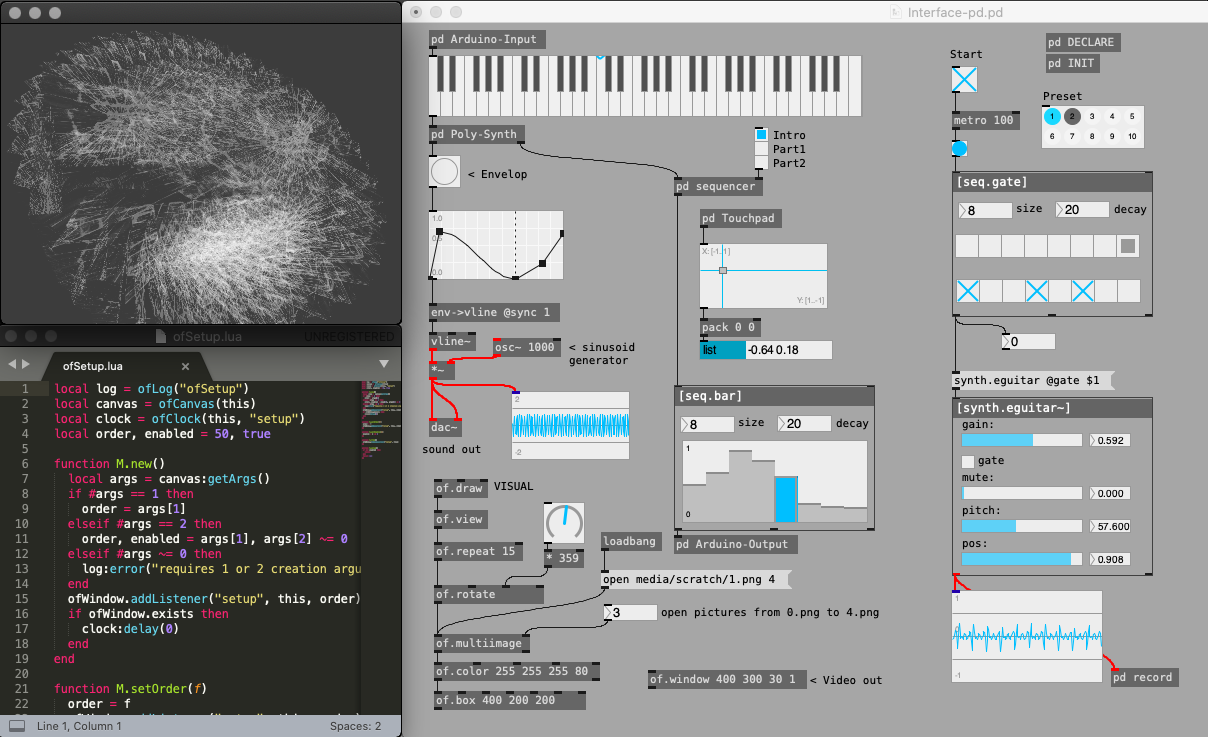
-
I added a template for every new patches and some personnal icons to ceammc bar:
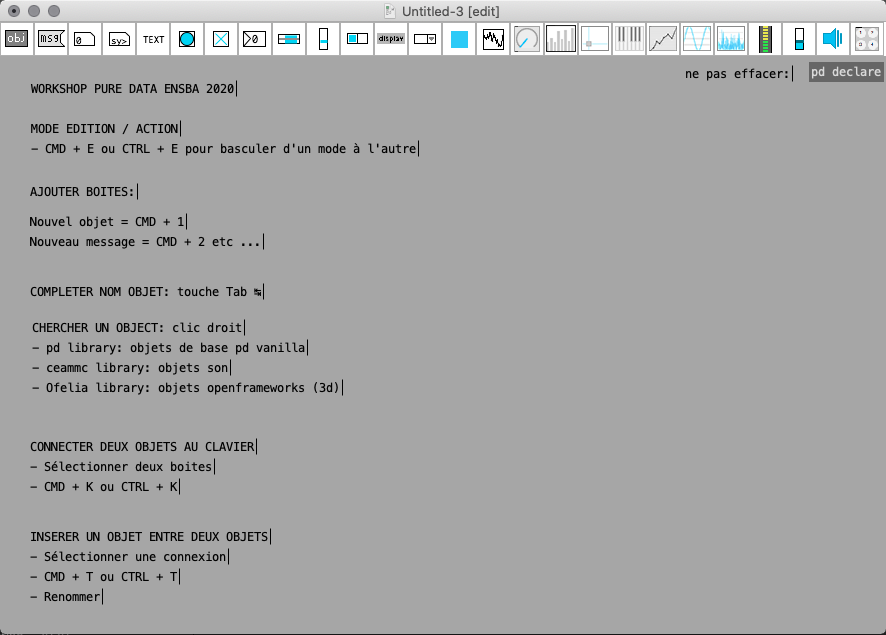
-
Here is my Intro-help.pd (accessible from any right clic in a patch)
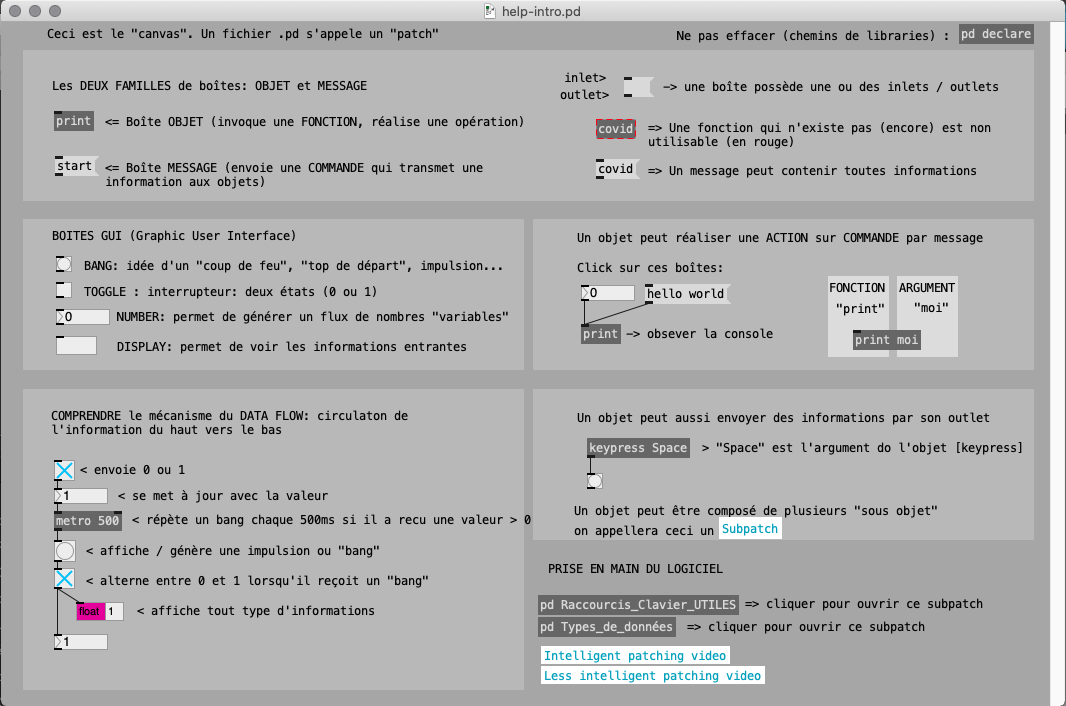
-
I added my own fast prototyping ofelia abstractions:
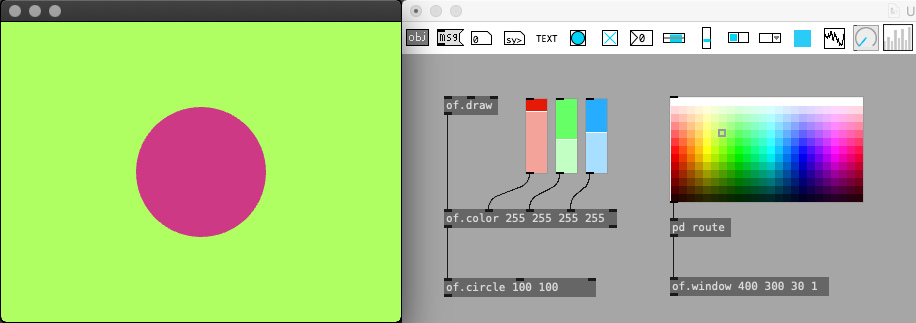
-
The right click show all the objects (also have auto-completion of course)
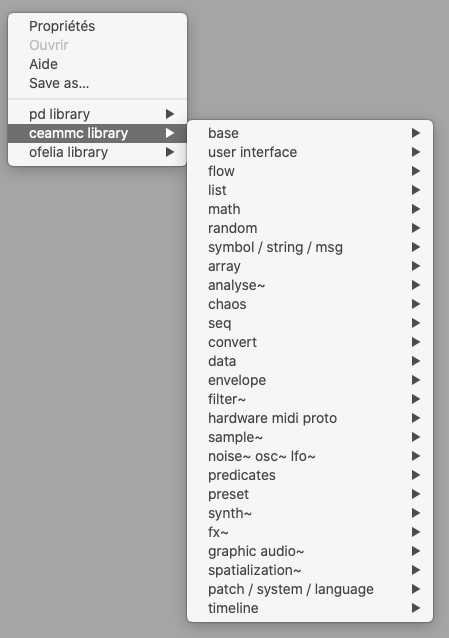
I think right-click on objects should propose "Online Reference" that lead to an online up-to-date documentation... or wiki.

